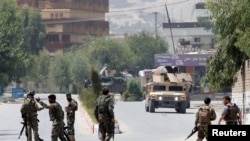The Taliban is denying reports it has stopped suicide attacks in Afghanistan to avoid civilian casualties.
The Islamist insurgency was responding to a New York Times newspaper article that reported Taliban leaders have ordered their fighters to refrain from undertaking suicide missions in Afghan cities in the wake of record levels of civilian casualties in such attacks.
The exclusive story quoted Taliban spokesman Zabihullah Mujahid confirming a change in insurgent tactics.
Mujahid rejected the remarks attributed to him and accused the American newspaper of either “misinterpreting” or “intentionally twisting” his comments. He said the issue of halting suicide attacks did not come up in the interview he gave to the paper.
Mujahid said suicide attacks are executed after thorough investigations identifying military targets wherever they exist to make sure Afghan civilians are not harmed in them.
“That is why planning of (insurgent) operations in cities takes time and they cannot be conducted in a haste,” said the Taliban spokesman. “These (suicide) attacks will be undertaken, God willing, as and when targets are identified,” Mujahid added.
The United Nations said earlier this week that the Afghan conflict killed nearly 1,700 civilians in the first half of 2018, the highest number recorded in any comparable time period over the last decade.
Last month, the Taliban briefly stopped hostilities during the three-day Muslim festival of Eid, triggering hopes a negotiated end to the Afghan war could be achieved.
The insurgent cease-fire overlapped with a unilateral government cessation of hostilities in its bid to encourage the Taliban to come to peace talks. But the Taliban has returned to the battlefield with more intensity since ending its unilateral cease-fire, inflicting heavy casualties on Afghan security forces.
The insurgency also has rejected the idea of talks with the Kabul government while demanding direct negotiations with the United States.
British Ambassador to Kabul Sir Nicholas Kay, while speaking to VOA, would not directly comment on the reported Taliban moratorium on suicide bombings but urged the insurgents to seek a peaceful settlement to the deadly war in Afghanistan.
"All Afghans want peace; they are desperate for peace. The happiness that broke out over three days (of the Eid cease-fire) all across Afghanistan was remarkable,” he noted.
“The popular message from the people in Afghanistan needs to be listened to by the leaders in Quetta, in Peshawar and they need to take account, this is the time for peace, people demand peace and the door is open to them and they need to walk through it,” the British envoy said.
Kay was referring to the two cities in neighboring Pakistan where Taliban leaders are allegedly sheltering and directing insurgent activities in Afghanistan.
Islamabad rejects the charges, saying years of counterterrorism operations have eliminated terrorist sanctuaries on Pakistani soil.
Military officials maintain insurgents have moved back to Afghanistan, where the Taliban controls or influences more than nearly half of the 407 districts.





